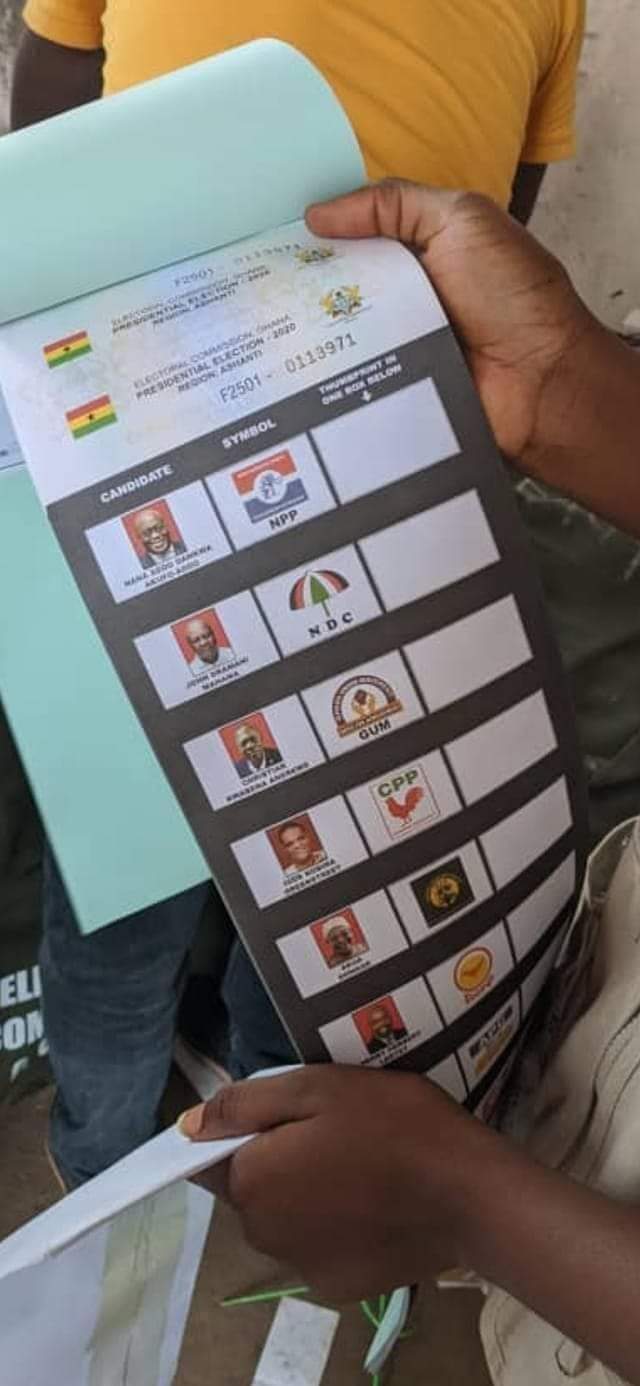
2020 Election: How EC intends to reduce rejected ballots
As part of measures to help reduce the number of rejected ballots in the December 7, 2020 general election, the Electoral Commission (EC) has increased the size of the black border lines separating where the thumbprint should go on the ballot paper.
In the 2016 general election, the EC introduced a similar measure.
Advertisement
Read also: All set for Election 2016; EC puts in measures to reduce rejected ballots
But in 2020, there has been a further improvement in the design of the ballot paper.
The boxes are larger and the black lines in between the candidate’s pictures, symbols and where the thumbprints should go are thicker.
This is to help minimise the incidence of thumbprints which stray from one box into another, causing a rejection of the ballot.
One of the main issues that has been of concern in Ghana's elections is the issue of rejected ballots.
The EC over the years have taken steps to minimise the incidence of rejected ballots with public education supported by the National Commission on Civic Education (NCCE).
Aside the extensive education on the voting process, rejected ballots are still high.
Read also: Rejected ballots, potential third force?
In spite of Ghana’s globally acclaimed democratic credentials, the issue of rejected ballots during the elections remains a challenge.
There has been concerns that without adequate education, going into the December 7 elections, the situation may repeat itself especially with 12 candidates on the ballot paper for the presidential election.
How reject ballots come about
Rejected ballots come about when some voters do not do things right or simply get confused with the voting process, thereby wasting the most sought-after electoral asset, the ballots.
In all the seven general elections Ghana has had – 1992, 1996, 2000, 2004, 2008, 2012 and 2016 – the rising incidence of rejected ballots triggered concerns among the electorate, particularly political pundits.
Since Ghana’s return to multiparty democracy in 1992, rejected ballots have increased in every election.
Some 149,813 rejected ballots were recorded in 1992, there were 111,108 in 1996 and 119,372 in 2000, before the figure surged to 188,123 in 2004.
In the 2008 general election in particular, rejected ballots shot up to 205,843, with the figure going up again to 243,280 in 2012, before reducing marginally to 167,349 in 2016.
All these are significantly huge numbers that cannot be discounted in any election.
Expressed as a fraction of the total number of voters, rejected ballots recorded 3.6 per cent in the 1992 polls, settled at 1.53 per cent in 1996 and 1.8 per cent in 2000.
In the 2000 presidential run-off, the percentage of rejected ballots was 1.58, going up again in 2004 to hit 2.13 per cent and then 2.4 per cent in the 2008 elections.
In the 2008 presidential election, for instance, the number of rejected ballots recorded in the first round was significantly higher than ever, both in terms of figures and percentages.
In 2012, it was 2.3 per cent and 1.46 per cent in 2016.
‘Rejected ballot party’
Hypothetically, the “rejected ballot party” placed third in the 2008 presidential race, ahead of Dr Papa Kwesi Nduom of the Convention People’s Party (CPP), who placed third with 113,494 votes, constituting 1.34 per cent of the total ballots cast, behind Professor John Evans Atta Mills of the National Democratic Congress (NDC), who placed second with 4,005,634, constituting 47.9 per cent of the votes and Nana Addo Dankwa Akufo-Addo of the New Patritotic Party (NPP), who garnered 49.13 per cent.
Indeed, the percentage of the rejected ballots far outstripped the combined performance of Dr Edward Mahama of the People’s National Convention (PNC), Mr Emmanuel Ansah Antwi of the Democratic Freedom Party (DFP), Mr Kwesi Amoafo Yeboah, an independent candidate and Mr Kwabena Adjei of the Reformed Patriotic Democrats (RPD).
Writer's email: [email protected]



